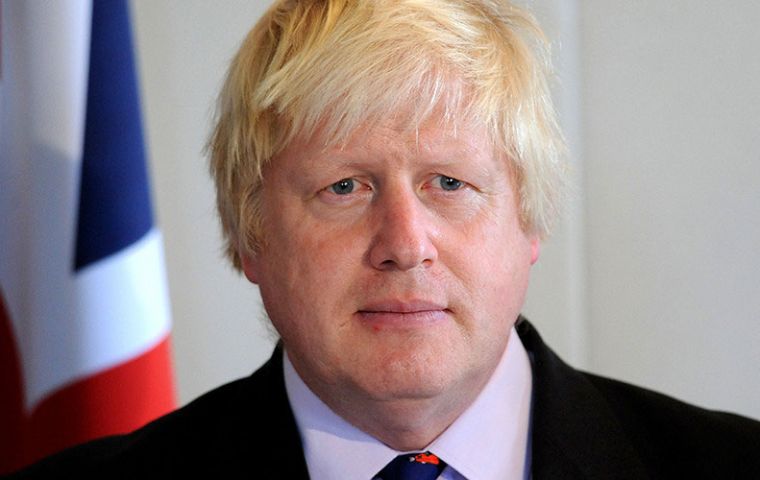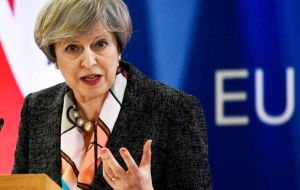MercoPress. South Atlantic News Agency
UK's £50bn Brexit “divorce bill”: follow the example of PM Thatcher, says Boris
 Johnson said it was “not reasonable” for UK to “continue to make vast budget payments” once out of EU and cited Thatcher's success at Fontainebleau in 1984
Johnson said it was “not reasonable” for UK to “continue to make vast budget payments” once out of EU and cited Thatcher's success at Fontainebleau in 1984  PM May said “there was only ever one Margaret Thatcher” and insisted the British people did not vote for Brexit to keep paying “huge sums” into the EU budget.
PM May said “there was only ever one Margaret Thatcher” and insisted the British people did not vote for Brexit to keep paying “huge sums” into the EU budget. Boris Johnson has told the BBC that Britain should reject any EU demands for a £50bn “exit bill” and follow the example of former PM Margaret Thatcher. It has been reported that EU negotiator Michel Barnier has said the UK must continue to pay into the EU until 2020.
Mr Johnson said it was “not reasonable” for the UK to “continue to make vast budget payments” once it left the EU and cited Mrs. Thatcher's success at the 1984 Fontainebleau Summit, when she threatened to halt payments to the EU.
“I think we have illustrious precedent in this matter, and you will doubtless recall the 1984 Fontainebleau Summit in which Mrs. Thatcher said she wanted her money back, and I think that is exactly what we will get,” he told BBC political editor Laura Kuenssberg in BBC Two's Brexit: Britain's Biggest Deal.
“It is not reasonable, I don't think, for the UK having left the EU to continue to make vast budget payments, I think everybody understands that and that's the reality.”
The UK won the rebate in 1984, after then prime minister Margaret Thatcher threatened to halt payments to the EU budget. At the time the UK was then the third poorest member of the Community but was on course to become the biggest net contributor to the EU budget.
Asked about Mr. Johnson's comments, Mrs. May said “there was only ever one Margaret Thatcher” and insisted the British people did not vote for Brexit to keep paying “huge sums” into the EU budget.
The Daily Telegraph has reported that Mr Barnier raised the idea that the UK may have to pay 60bn Euros (£52bn) to cover the UK's share of outstanding pension liabilities, loan guarantees and spending on UK-based projects until 2020 - even if it leaves the EU by 2019.
Irish premier Enda Kenny suggested he may back demands for the UK to pay a “divorce bill” when it leaves the EU, telling reporters at the summit on Thursday: ”When you sign on for a contract, you commit yourself to participation.




Top Comments
Disclaimer & comment rules-

-

-

Read all commentsContract ends when we leave.
Mar 13th, 2017 - 06:29 pm +1http://www.bbc.co.uk/news/uk-politics-39154218
“if agreement is not reached, all EU law - including provisions concerning ongoing financial contributions and machinery for adjudication - will cease to apply, and the UK would be subject to no enforceable obligation to make any financial contribution at all,”
Going to piss on Mr Barnier’s fireworks, expect the EU side to walk out in the first week of negotiations, they don’t have a case legally, bluff bluster and hold up any trade deal are their only cards.
Problem is no deal hurts them just as much, more in certain areas like German car makers 8% tariff, French and Spanish Agriculture 30-40% tariffs in one of their biggest export markets.
Trillions in finical instruments sourced in London.
French fishermen will all but cease to exist, 80% of the fish landed by the Normandy fleet come from UK waters.
Responsibility for paying EU salaries and pensions rest solely with the EU annual budget, where it is the MEMBERS responsibility to pay their contributions to the budget. MEMBERS being the pertinent word here, no mention of ex members note.
Under the Lisbon Treaty, the EU became a legal entity in its own right, able to act independently in international affairs and responsible for its financial decisions.
A separate “legal personality” responsible for settling its own debts and its own pension contracts.
“ When you sign on for a contract, you commit yourself to participation ” Exactly correct and when you leave a contract you do NOT keep paying. I am sure that some of the projects that we signed up for will be honoured by the UK but we will not be paying for all the pensions of all the numpties in Brussels. I think that Mrs May ought to say to the EU, when you audit the Eu's accounts we will look at it with dismay, dispondacy or even disdain.But alas the EU WIL NOT publish anything that would destroy the gravy train.
Mar 13th, 2017 - 04:51 pm 0“At the time the UK was then the third poorest member of the Community but was on course to become the biggest net contributor to the EU budget.”
Mar 13th, 2017 - 09:29 pm 0Wait, wasn't it that the UK was doing terribly inside the EU? They were third poorest? Geez. (and even worse before in the 1970s when they had to be bailed out by the IMF).
Doesn't make sense they are less poor now if they did so badly under the yolk of Brussels and Berlin.
Commenting for this story is now closed.
If you have a Facebook account, become a fan and comment on our Facebook Page!